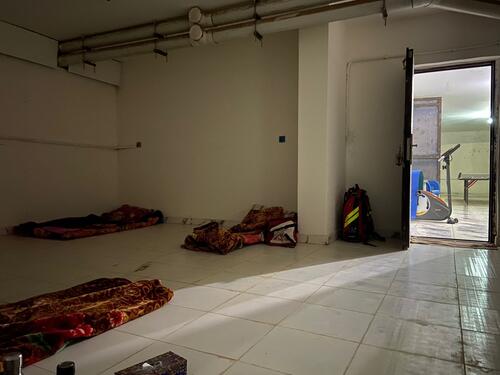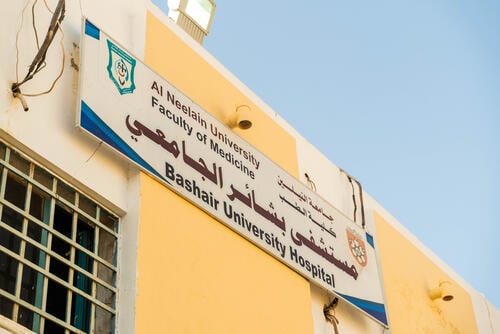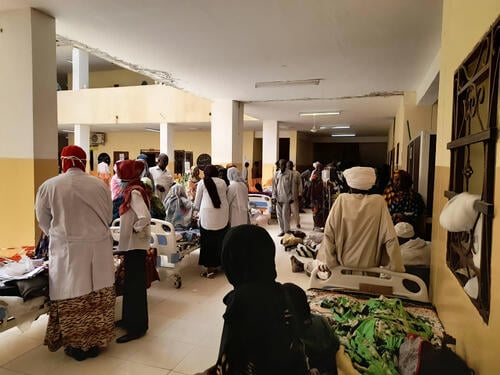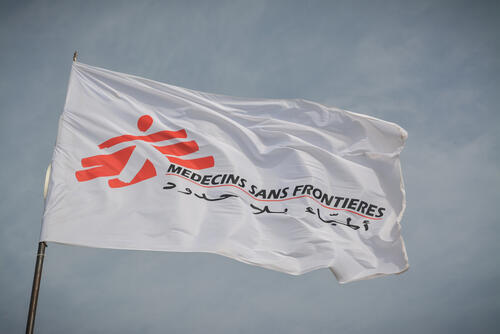Camille Marquis is the outgoing Advocacy Manager for Médecins Sans Frontières (MSF) in Sudan. She was due to leave Sudan, after having been on assignment for 12 months, the day the conflict escalated, forcing her and her colleagues into a bunker. She recounts what’s been happening in the capital, Khartoum.
“On Saturday, when I heard the first gunshots outside at about 8.30am while having breakfast, I was just starting what I thought was my last day in Khartoum. My luggage was ready, my fridge and cupboards emptied, with just a few hours to wait before going to the airport to fly home after one year spent in Sudan.
Quickly, we all went down to the safe room of our guesthouse, in the basement. I spent the day there sitting on the floor, along with more than 10 colleagues, jumping at the sound of heavy shooting, of low-flying war planes and subsequent bangs from air strikes. The sound was echoing in the room, walls and small windows were shaking. The sound of silence often ensued a blast, but never lasted for long.
That first night, sleeping on the floor surrounded by my colleagues, while I was supposed to be at the airport to fly home, I was thinking of the people stuck inside the airport, where heavy fighting has been taking place. I could have been one of them. Some were wounded and have not been able to leave the airport to be treated.
People are running out of food, water, fuel, and are taking great risks to get supplies in shops that are already facing shortages.Camille Marquis is outgoing MSF Advocacy Manager in Sudan
I was thinking also of all my Sudanese colleagues and more generally people living in Khartoum who, unlike me, did not have the chance to be sleeping in a bunker, with emergency food stocks and water. It is now the sixth day of fighting in the streets of densely populated Khartoum, with its roughly 10 million inhabitants. People are running out of food, water, fuel, and are taking great risks to get supplies in shops that are already facing shortages.
Hearing all the destruction outside, reading about the loss of life, about the wounded and sick people who cannot get to a functioning hospital or clinic, even in the capital city of Khartoum, makes me incredibly sad for Sudan and for its people, stuck amid fighting between armed forces of their own country. People are struggling to get food, water, medication, healthcare… and these are just the first few days. The consequences and aftermath of this fighting on the already-high humanitarian needs will be dramatic.
For a year, I have been monitoring humanitarian needs in Sudan and documenting the impact of the lack of response to those needs on the health and nutrition of Sudanese people, especially children. We had just released a briefing note to raise the alarm on the dire needs of people living in West Darfur, calling on humanitarian groups and donors to scale up the response and support Sudan’s already collapsing health system.
If humanitarian and healthcare workers are unable to continue working safely and if patients are unable to reach a hospital without fear, millions of children and other vulnerable people in Sudan are at risk of severe health consequences.Camille Marquis is outgoing MSF Advocacy Manager in Sudan
Among my colleagues currently sheltering in Khartoum, a nurse and a nurse trainer were meant to fly to El Geneina, in West Darfur, to work at the MSF-supported hospital and treat severely malnourished and sick children. MSF’s psychologist working in El Geneina’s hospital is also stuck in Khartoum. Because of the conflict, they may not be able to go back there anytime soon to do their lifesaving humanitarian work. Teams in West Darfur report an unusually low number of patients in the wards, probably a sign of people fearing to leave their homes and come to the hospital in such an unstable security context. Last year, in El Geneina, the malnutrition peak started in early May, less than 10 days from now.
If humanitarian and healthcare workers are unable to continue working safely – to provide healthcare and nutrition support, but also food assistance – and if patients are unable to access assistance and reach a hospital without fear, millions of children and other vulnerable people in Sudan are at risk of severe health consequences.
A third of the population in Sudan was already deemed food insecure before this ongoing conflict. We can only expect the situation to get worse, all over Sudan.”
MSF continues to provide medical care in Sudan where possible; however, many staff members currently cannot move due to intense fighting in the capital, Khartoum, and across the country. The safety of our staff and patients is our top priority, and we are supporting staff members according to their specific circumstances. We call on all parties to the conflict to guarantee the safety of medical staff, patients, and health facilities, and to allow the safe passage of ambulances, health and humanitarian workers, and people seeking health care. In recent years we had projects in the States of Khartoum, Gedaref, Kassala, Blue Nile, White Nile, North Darfur, East Darfur, West Darfur, South Darfur and Central Darfur, with emergency teams launching activities in other states as needed.






